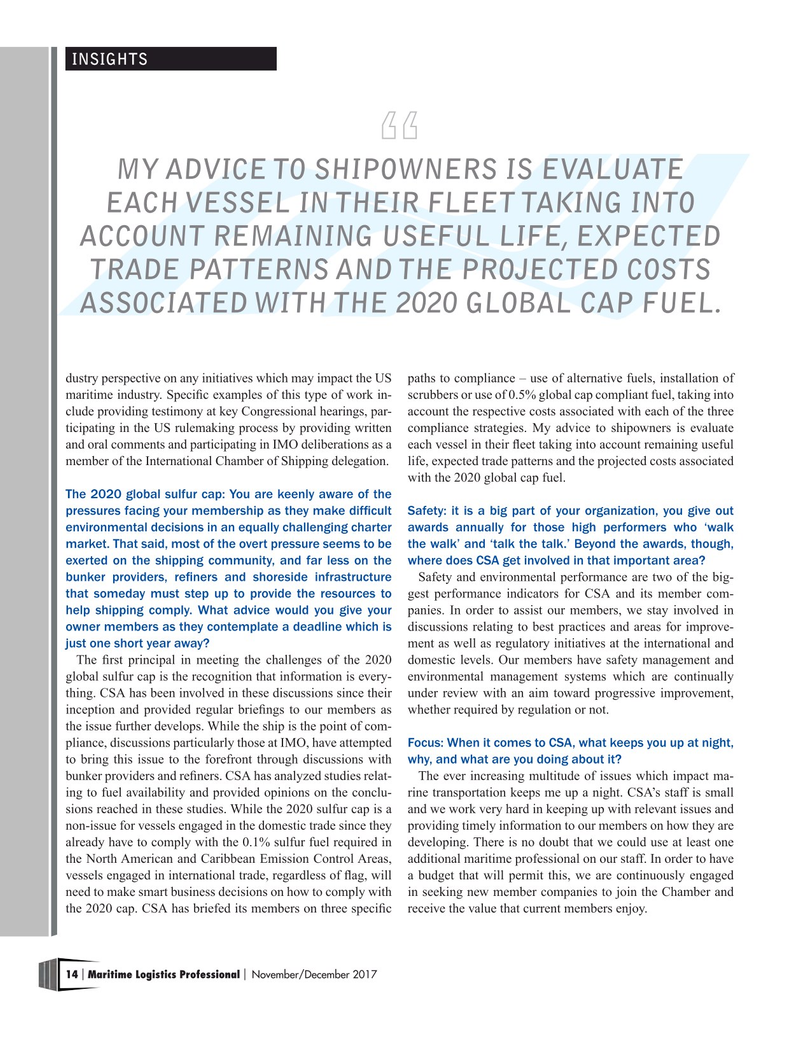
Page 14: of Maritime Logistics Professional Magazine (Nov/Dec 2017)
GREEN PORTS
Read this page in Pdf, Flash or Html5 edition of Nov/Dec 2017 Maritime Logistics Professional Magazine
INSIGHTS
MY ADVICE TO SHIPOWNERS IS EVALUATE
EACH VESSEL IN THEIR FLEET TAKING INTO
ACCOUNT REMAINING USEFUL LIFE, EXPECTED
TRADE PATTERNS AND THE PROJECTED COSTS
ASSOCIATED WITH THE 2020 GLOBAL CAP FUEL.
dustry perspective on any initiatives which may impact the US paths to compliance – use of alternative fuels, installation of maritime industry. Specifc examples of this type of work in- scrubbers or use of 0.5% global cap compliant fuel, taking into clude providing testimony at key Congressional hearings, par- account the respective costs associated with each of the three ticipating in the US rulemaking process by providing written compliance strategies. My advice to shipowners is evaluate and oral comments and participating in IMO deliberations as a each vessel in their feet taking into account remaining useful member of the International Chamber of Shipping delegation. life, expected trade patterns and the projected costs associated with the 2020 global cap fuel.
The 2020 global sulfur cap: You are keenly aware of the pressures facing your membership as they make diffcult Safety: it is a big part of your organization, you give out environmental decisions in an equally challenging charter awards annually for those high performers who ‘walk market. That said, most of the overt pressure seems to be the w alk’ and ‘talk the talk.’ Beyond the awards, though, exerted on the shipping community, and far less on the where does CSA get involved in that important area?
bunker pr oviders, refners and shoreside infrastructure Safety and environmental performance are two of the big- that someday must step up to provide the resources to gest performance indicators for CSA and its member com- help shipping comply. What advice would you give your panies. In order to assist our members, we stay involved in owner members as they contemplate a deadline which is discussions relating to best practices and areas for improve- just one short year away? ment as well as regulatory initiatives at the international and
The frst principal in meeting the challenges of the 2020 domestic levels. Our members have safety management and global sulfur cap is the recognition that information is every- environmental management systems which are continually thing. CSA has been involved in these discussions since their under review with an aim toward progressive improvement, inception and provided regular briefngs to our members as whether required by regulation or not.
the issue further develops. While the ship is the point of com- pliance, discussions particularly those at IMO, have attempted Focus: When it comes to CSA, what keeps you up at night, to bring this issue to the forefront through discussions with why, and what are you doing about it?
bunker providers and refners. CSA has analyzed studies relat- The ever increasing multitude of issues which impact ma- ing to fuel availability and provided opinions on the conclu- rine transportation keeps me up a night. CSA’s staff is small sions reached in these studies. While the 2020 sulfur cap is a and we work very hard in keeping up with relevant issues and non-issue for vessels engaged in the domestic trade since they providing timely information to our members on how they are already have to comply with the 0.1% sulfur fuel required in developing. There is no doubt that we could use at least one the North American and Caribbean Emission Control Areas, additional maritime professional on our staff. In order to have vessels engaged in international trade, regardless of fag, will a budget that will permit this, we are continuously engaged need to make smart business decisions on how to comply with in seeking new member companies to join the Chamber and the 2020 cap. CSA has briefed its members on three specifc receive the value that current members enjoy.
14 Maritime Logistics Professional November/December 2017 | |

 13
13

 15
15
